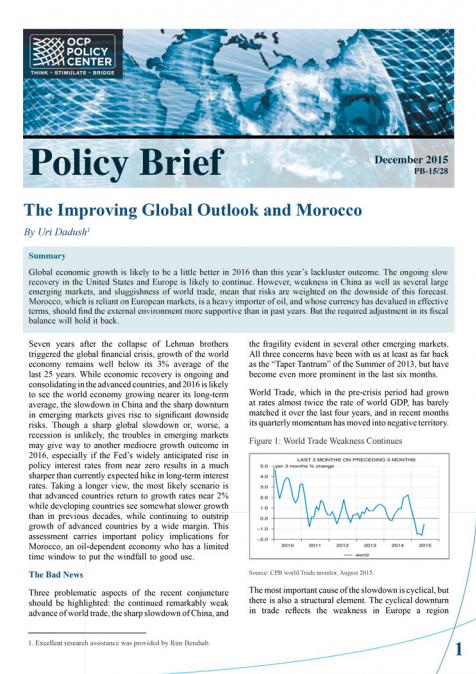Publications /
Opinion
According to this month’s OECD economic outlook, global GDP --- which took a huge hit from the pandemic and is still 3% below its level of a year ago – will not recover its pre-pandemic level until the end of 2021. In a downside scenario, the return could take almost a year longer. The OECD predictions, which imply high and protracted unemployment, are in line with the view of many other official and private organizations. The arrival of effective vaccines such as Pfizer-BioNTech was widely expected and is already reflected – at least to some degree – in these assessments. Given the massive demand for vaccines around the world, regulatory barriers, logistics difficulties, and the impossibility of ramping up production quickly, the caution is understandable.
But could it be that the effect of vaccines on confidence and economic activity is underestimated, and that they will lead to a more robust and more rapid economic and health recovery than anticipated? My answer is yes, provided inoculations prioritize those at risk. Whether that will happen in practice depends on the quality of governance.
The Herd Immunity Myth
From the outset, I would like to dispel a common misconception. Many believe that the purpose of vaccination is to achieve herd immunity, requiring inoculation of about 70% of the population. But, even considering that the spread of the virus has already conveyed some measure of immunity across the population, this objective is unachievable in any country individually within a reasonable timeframe. Furthermore, in a globalized economy, herd immunity cannot be achieved without hermetically closing borders. Instead, it would require vaccinating about 5 billion people across the world from a standing start, and to do so in a way that avoids the virus propagating in any single locality from which it can spread. This means, for example, that sufficient vaccinations would need to be uniformly distributed in every one of the world’s cities in proportion to population. Even if the capacity existed to produce the required quantity of vaccines, poor countries were able to cover the cost, and enough people were willing to be vaccinated, the logistics would be prohibitive. To put the challenge in perspective, global adoption of vaccination against smallpox, a far more deadly disease than Covid-19, eventually eradicated the scourge. However, even with an effective vaccine, it took about 25 years after the launch of the first efforts in the Americas to do so.
The mistaken belief that herd immunity – or something awfully close to it – is a necessary condition for the economy to fully recover causes many consumers, investors, and even experts, to be excessively gloomy about its prospects.
The Right Way to Think About Vaccination
Instead, at this stage, the appropriate purpose of vaccinations should be to radically reduce the incidence of serious Covid-19 illness and death. Importantly, reducing the incidence of serious disease would also ensure that the health system returns to normal operating conditions, enabling good care to be available for all patients and for all illnesses. If that can be achieved, then lockdowns will become unnecessary and the global economy could return to operating near its long-term potential, implying more rapid growth sooner than is currently built into expectations. This acceleration can occur even if vaccines are only available to the most vulnerable groups and only in a critical mass of economies. A critical mass of economies would, for example, include the United States, the European Union, Japan, and China, which together account for about 2/3 of world trade.
Consider the United States, the world’s largest economy and an epicenter of the pandemic. It turns out that, even though the US has purchased less vaccines per capita than many other countries, planned vaccinations in the first 4 months of next year are – if appropriately delivered – more than sufficient to virtually eliminate serious Covid-19 disease.
To start with, approximately 40% of US Covid-19 deaths occur in nursing homes, which house about 1.7 million people. Initial reports suggest that, alive to the danger of Covid-19, nearly all residents of nursing homes are prepared to be vaccinated. If all were vaccinated, counting 2 doses per person, that would use up less than 1/5th of the 20 million doses of Pfizer-BioNTech vaccines to be made available in 2020. Next in line would be Americans over 65 which (excluding those in nursing homes) account for about 48 million people and another 40% of COVID-19 deaths. Next after that would be American adults under the age of 65 who are severely obese (Body Mass Index over 35) and likely suffer from comorbidities such as diabetes. This group probably accounts for about 15 million people and another 10% of the deaths from COVID-19. Thus, a rough count of the American population most at risk from Covid-19 would amount to 65 million people and account for 90% of all deaths. If President-elect Biden delivers on 100 million vaccinations in his first 100 days in office, as he has promised, and these come on top of those already completed, by the end of April the death rate from COVID-19 could be little different than that of the seasonal flu.
A Global Challenge Which Can Be Met
What about the rest of the world? In the EU and Japan, the share of the vulnerable population is larger than that of the United States: though the incidence of severe obesity is less, there are many more older people. However, these countries have purchased larger quantities of vaccine and on similar delivery schedules as the United States. China stands out as having contained the virus even before vaccines became available. It is home to nearly 160 million people over 65, but they represent a far smaller share of the population than in advanced countries. China has approved the Astra Zeneca vaccine and has at least 3 home-grown vaccines in advanced trials. It has already vaccinated over 1 million people.
Economic trends in the world’s poorest countries, such as those in Africa and Central America, will also be critically determined by the path of the virus. To acquire and apply vaccines they will have to rely on external aid, through mechanisms such as Covax. Even in the best scenario, widespread vaccination against Covid-19 in these countries will take many years to complete. However, these nations have far younger populations and the co-morbidities that complicate Covid-19 disease are less prevalent, accounting for their far lower rate of mortality from the virus. They face greater financial, logistics and organizational impediments than richer nations, but effective vaccination campaigns are possible and can be completed relatively quickly if they are targeted and risk based. For example, Sub-Saharan Africa is home to over 1.1 billion people but only 3% of its population, or 33 million people, is over the age of 65 – compared to 50 million in the United States alone. Depending on the vaccine used, the cost of inoculating all elderly people in Sub-Saharan Africa could run from $130 million to $800 million. To put this sum in perspective, in 2018 Sub-Saharan African countries received about $44 billion in foreign aid.
Can economies recover even if vaccination of large groups is delayed and the virus continues to spread among them? The answer is yes, so long as the health system is not overwhelmed by large numbers of severely ill people, which is far less likely to happen if the infected are young and healthy. The sharp decline in death and disease rates due to vaccination of the most vulnerable groups will reduce the fear of the virus – a major source of consumer and investor uncertainty – and will enable many to return to work without the fear of sudden lockdowns. In many localities across the United States and Europe the lifting of restrictions over the Summer months was followed by a sharp recovery in economic activity which was sustained until restrictions were reimposed.
The Governance Question
Although much effort is expended to convince people that the vaccine is safe and effective, and everyone should take it, the reality is that they will remain a scarce resource across the world, over many months, and perhaps years, to come. If one relied purely on the market, the price of vaccines would rise to thousands of dollars, the rich and their offspring would be protected, while the poor would be excluded, and there would be little correlation between vaccination and risk from the virus; in fact, there is much reason to think that the vaccine would go predominantly to those least likely to contract severe disease and best equipped to deal with it. Relying on the market to allocate vaccines would only mean more delay in the health and economic recovery and more inequality.
Rationing of any kind is not a familiar concept, especially in the richest economies, but we are stuck with it in this case. By default, then, governments must decide. Based on efficiency and equity criteria – to minimize disease and economic disruption—, there is no doubt (at least in the mind of this writer) that the vaccine should go to first the old and sick. One can also make a strong efficiency and equity argument for giving priority to front-line health workers, i.e., those who care directly for Covid-19 patients, who are exposed to the virus every day and whose capacity to deal with the pandemic must be preserved.
But government decisions are rarely based only on efficiency and equity – power, ideology, and rent-seeking also count, and often play the most important role. For example, powerful health care unions can insist, and have done so (e.g., in Italy) that all health-care workers must come first, even though most of this large group run no more Covid-19 risk than the population at large, and many less so. Employers can insist, and have done so (e.g., in the United States) that all “essential workers”, those that cannot work remotely, must be prioritized ahead of older people, even though most essential workers are young and healthy. Advocacy groups push for minorities to be among the first to be vaccinated on account of the comparatively high incidence of disease among them, even though most are young and healthy. Politicians can use their leverage to go to the top of the queue ostensibly on account of their important functions, or, more cynically, to “give an example”. Even more pernicious, systemic corruption can become the arbiter of the allocation of vaccines.
In vaccination as in all other policy endeavors, the quality of governance will play a crucial role in determining outcomes. In this case, the public choice is between fostering a rapid health and economic recovery or favoring large powerful groups.
The opinions expressed in this article belong to the author.




